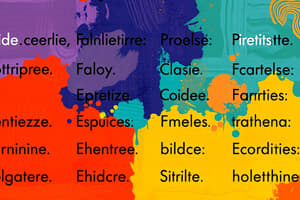Podcast
Questions and Answers
What does the word 'dormir' mean?
What does the word 'dormir' mean?
- to sleep (correct)
- to run
- to eat
- to play
What is the present subjunctive form of 'yo' for the verb 'dormir'?
What is the present subjunctive form of 'yo' for the verb 'dormir'?
duerma
What is the present subjunctive form of 'tú' for the verb 'dormir'?
What is the present subjunctive form of 'tú' for the verb 'dormir'?
duermas
What is the present subjunctive form of 'él/ella/usted' for the verb 'dormir'?
What is the present subjunctive form of 'él/ella/usted' for the verb 'dormir'?
What is the present subjunctive form of 'nosotros/nosotras' for the verb 'dormir'?
What is the present subjunctive form of 'nosotros/nosotras' for the verb 'dormir'?
What is the present subjunctive form of 'vosotros/vosotras' for the verb 'dormir'?
What is the present subjunctive form of 'vosotros/vosotras' for the verb 'dormir'?
What is the present subjunctive form of 'ellos/ellas/ustedes' for the verb 'dormir'?
What is the present subjunctive form of 'ellos/ellas/ustedes' for the verb 'dormir'?
Flashcards are hidden until you start studying
Study Notes
Present Subjunctive Conjugation of "Dormir"
- The verb "dormir" translates to "to sleep" in English, indicating the action of resting or undergoing sleep.
Conjugation Forms
- yo: conjugated as "duerma" for the first-person singular, indicating I sleep.
- tú: conjugated as "duermas" for the second-person singular (informal), indicating you (singular) sleep.
- él/ella/usted: conjugated as "duerma" for the third-person singular and formal "you," indicating he, she, or you (formal) sleep.
- nosotros/nosotras: conjugated as "durmamos" for the first-person plural, indicating we sleep.
- vosotros/vosotras: conjugated as "durmáis" for the second-person plural (informal), indicating you all (in Spain) sleep.
- ellos/ellas/ustedes: conjugated as "duerman" for the third-person plural and formal plural "you," indicating they or you all sleep.
Key Highlights
- The present subjunctive is used to express desires, doubts, or hypothetical situations in Spanish.
- The conjugation of "dormir" in the present subjunctive shifts from the root "dorm-" to "duerm-" depending on the subject pronoun.
- The irregular forms mainly show changes in the vowel, demonstrating the unique structure in the subjunctive mood.
Studying That Suits You
Use AI to generate personalized quizzes and flashcards to suit your learning preferences.




